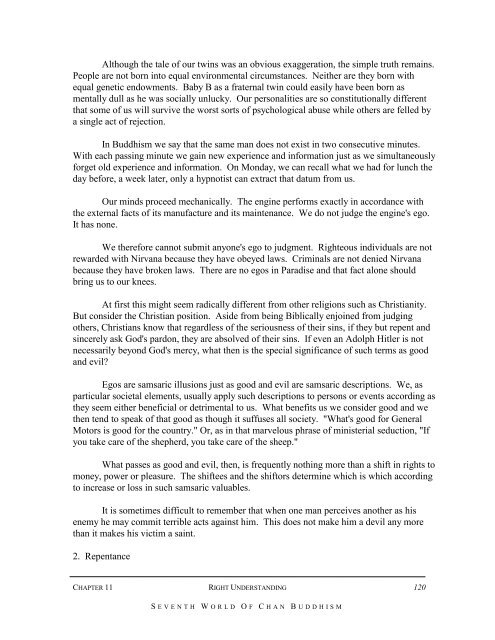seventh world of chan buddhism - Zen Buddhist Order of Hsu Yun
seventh world of chan buddhism - Zen Buddhist Order of Hsu Yun
seventh world of chan buddhism - Zen Buddhist Order of Hsu Yun
Create successful ePaper yourself
Turn your PDF publications into a flip-book with our unique Google optimized e-Paper software.
Although the tale <strong>of</strong> our twins was an obvious exaggeration, the simple truth remains.<br />
People are not born into equal environmental circumstances. Neither are they born with<br />
equal genetic endowments. Baby B as a fraternal twin could easily have been born as<br />
mentally dull as he was socially unlucky. Our personalities are so constitutionally different<br />
that some <strong>of</strong> us will survive the worst sorts <strong>of</strong> psychological abuse while others are felled by<br />
a single act <strong>of</strong> rejection.<br />
In Buddhism we say that the same man does not exist in two consecutive minutes.<br />
With each passing minute we gain new experience and information just as we simultaneously<br />
forget old experience and information. On Monday, we can recall what we had for lunch the<br />
day before, a week later, only a hypnotist can extract that datum from us.<br />
Our minds proceed me<strong>chan</strong>ically. The engine performs exactly in accordance with<br />
the external facts <strong>of</strong> its manufacture and its maintenance. We do not judge the engine's ego.<br />
It has none.<br />
We therefore cannot submit anyone's ego to judgment. Righteous individuals are not<br />
rewarded with Nirvana because they have obeyed laws. Criminals are not denied Nirvana<br />
because they have broken laws. There are no egos in Paradise and that fact alone should<br />
bring us to our knees.<br />
At first this might seem radically different from other religions such as Christianity.<br />
But consider the Christian position. Aside from being Biblically enjoined from judging<br />
others, Christians know that regardless <strong>of</strong> the seriousness <strong>of</strong> their sins, if they but repent and<br />
sincerely ask God's pardon, they are absolved <strong>of</strong> their sins. If even an Adolph Hitler is not<br />
necessarily beyond God's mercy, what then is the special significance <strong>of</strong> such terms as good<br />
and evil?<br />
Egos are samsaric illusions just as good and evil are samsaric descriptions. We, as<br />
particular societal elements, usually apply such descriptions to persons or events according as<br />
they seem either beneficial or detrimental to us. What benefits us we consider good and we<br />
then tend to speak <strong>of</strong> that good as though it suffuses all society. "What's good for General<br />
Motors is good for the country." Or, as in that marvelous phrase <strong>of</strong> ministerial seduction, "If<br />
you take care <strong>of</strong> the shepherd, you take care <strong>of</strong> the sheep."<br />
What passes as good and evil, then, is frequently nothing more than a shift in rights to<br />
money, power or pleasure. The shiftees and the shiftors determine which is which according<br />
to increase or loss in such samsaric valuables.<br />
It is sometimes difficult to remember that when one man perceives another as his<br />
enemy he may commit terrible acts against him. This does not make him a devil any more<br />
than it makes his victim a saint.<br />
2. Repentance<br />
CHAPTER 11 RIGHT UNDERSTANDING<br />
S EVENTH W ORLD O F C HAN B UDDHISM<br />
120


